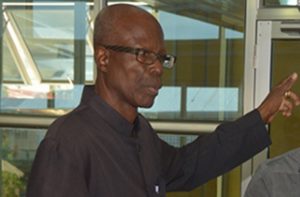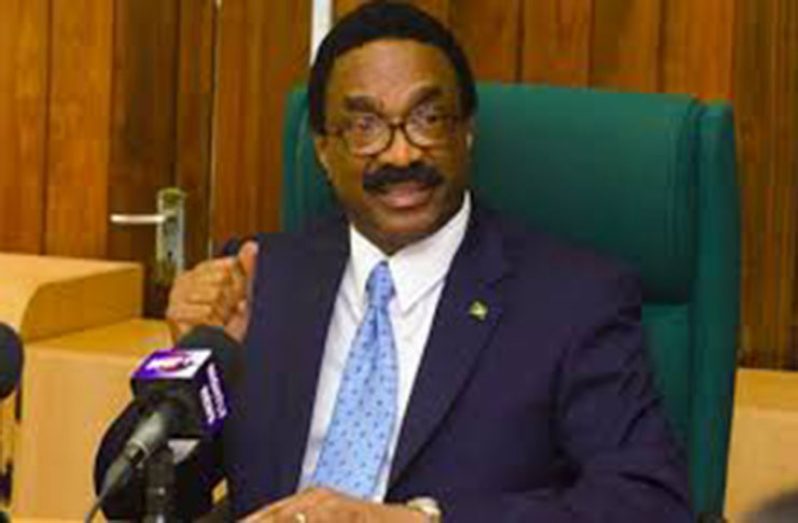…AG says GECOM has the jurisdiction to so do
ATTORNEY General Basil Williams, through his Legal Counsel Maxwell Edwards, said the widespread anomalies unearthed during the National Recount, are grounds for the annulment of the General and Regional Elections held last March, and the Guyana Elections Commission (GECOM) has the jurisdiction to do so.
The Attorney General is the fourth named respondent in a case brought against GECOM by a private citizen – Eslyn David – over its failure to pronounce on the credibility of the Elections in accordance with Order No. 60, upon which the National Recount was executed. In ordering the Chief Elections Officer (CEO), Keith Lowenfield, to compile an Elections Report in accordance with Section 96 of the Representation of the People Act and the Article 177 (2) of the Constitution for the declaration of the results, the Chair of GECOM, Justice (Ret’d) Claudette Singh, indicated that Elections Commission has no authority to investigate the anomalies or annul the elections.
But the AG in his written submissions to the Court of Appeal on Friday, said GECOM as a Constitutional Commission is a “quasi-judicial” body as he referenced to the ruling made in the case ‘All Party Hill Leaders’ Conference Captain M.A Sangma & Ors (1977). In that case, the Elections Commission of India was deemed a quasi-judicial body.
Using the very Order that triggered the National Recount, GECOM, Williams said, empowered itself to treat with issues of credibility in the recount process. In keeping with that Order, the CEO, on June 13, submitted a Report on the National Recount to the Elections Commission, in which he made it known that credibility of the elections were affected due to anomalies and cases of voter impersonation.
“Finally, the summation of anomalies and instances of voter impersonation identified in Districts [1 to 10] clearly does not appear to satisfy the criteria of impartiality, fairness and compliance with provisions of the Constitution and the Representation of the People Act, Chapter 1:03. Consequently, on the basis of the votes counted and the information furnished from the recount, it cannot be ascertained that the results for the Districts [1 to 10] meet the standard of fair and credible Elections,” the CEO had said in his report.

Williams submitted that in light of the evidence that is before the Commission as contained in the Observation Reports and other supporting documents, GECOM ought not to request the CEO to submit a report under Section 96 of the Representation of the People Act on the ground that the irregularities, discrepancies and anomalies affected the integrity and credibility of the Elections.
In support of his position, the Attorney referenced to Chilima anor v Mutharika (Malawi, 2019) where there were allegations of irregularities and anomalies, and it was concluded that the irregularities and anomalies had been so widespread, systematic and grave that the integrity of the results had been seriously compromised. And that the results of the elections could not be trusted as a true reflection of the will of the voters as expressed through their votes cast during the elections held in May, 2019.
In the case in question, the irregularities included altered, varied and transmitted results in clear disregard of the process recorded in the tally sheet; total number of used and unused ballot papers was lower than the ballot paper issued and the number of votes of candidates was not balancing with the total number of valid votes cast among other anomalies.
“The five (5) member Bench imposed a duty on the Elections Commission to respond to requests by contesting parties to resolve irregularities, anomalies and discrepancies before declaring the results of the elections. The Court held that a failure to do so can amount to bias on the part of the Commission and a gross and unjustifiable dereliction of duty under the Malawian Constitution (similar to article 162(1)(b) of the Guyana Constitution) to conduct impartial elections,” Williams pointed out.
With no declaration made to date, the AG submitted that Elections Commission has jurisdiction to declare that the Elections are cancelled on the ground of “uncovered manifest and pervasive irregularities, anomalies and discrepancies” GECOM, Williams argued, is duty bound under Article 162 (1) (a) of the Constitution to deliver results that are fair and credible, and according to the CEO’s report, the 2020 Elections were far from credible.
“It is a decided principle of law that the Elections Commission, in furtherance of its duty to deliver results that are fair, credible and truthfully reflect the will of the people, can exercise its inherent jurisdiction to cancel an election on the ground of uncovered manifest and pervasive irregularities, anomalies and discrepancies,” he submitted to the appellate Court.
Should the Elections Commission ignore the evidence of corruption and proceed with a declaration, it in effect would be undermining its own integrity, Williams submitted. The public’s confidence in the electoral process, he added, would undoubtedly be eroded.



.jpg)








